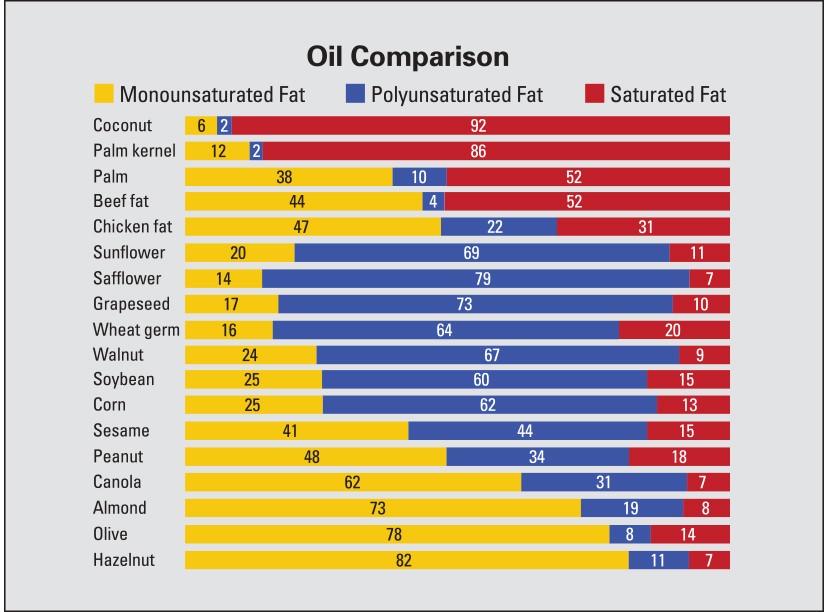
When selecting a cooking oil, it is important to understand the differences between each type in order to make an informed decision.
If you suffer from diabetes, high cholesterol, or high blood pressure, you may already be familiar with the importance of managing your diet. While eating healthy is essential for maintaining your health, it can sometimes be difficult to know which ingredients are best for you. Today we’re focusing on cooking oil and its effects on your cholesterol level. Let’s dive in!
What is Cholesterol?
Cholesterol is a soft waxy substance found in your blood. It circulates through the body as blood does. Your body needs cholesterol to build healthy cells, but high levels of cholesterol can increase your risk of heart disease.
It’s a type of lipid, or fat, that is made by the liver and found in certain foods we eat. Cholesterol helps the body make hormones, vitamin D, and substances that help digest foods. But too much cholesterol can be bad for your health. High levels of cholesterol in the blood can cause a buildup of plaque on the walls of your arteries, which over time, narrows the arteries. This blockage can lead to heart disease, stroke, and other health problems. Knowing what cholesterol is, what it does in your body, and how it affects your overall health is important in order to maintain a healthy lifestyle.
High cholesterol is closely linked with many other medical problems. People with high cholesterol often develop high blood pressure as well.
What are the different types of Cholesterol?
Cholesterol is present in every cell of the body and has important natural functions. It aids in the digestion of foods, producing hormones, and generating vitamin D. The body produces it, but people also consume it in food. There are two types:
- Low-density lipoprotein (LDL) (bad cholesterol) and
- High-density lipoprotein (HDL) (good cholesterol).
LDL cholesterol is often referred to as “bad” cholesterol because it can build up in your arteries and increase your risk of heart-related diseases. HDL cholesterol is often referred to as “good” cholesterol because it helps transport LDL cholesterol away from your arteries.
What could cause your Cholesterol level to go up
The liver produces around 80% of the cholesterol in your body. The other 20% comes from the foods we eat. The foods that raise our blood cholesterol the most are high in saturated fat, like fatty meat and whole-fat dairy products, saturated oil like palm oil, snack foods, and some processed foods. Foods that have high levels of dietary cholesterol include:
Fast foods
Fast food tends to be high in fried fats and almost always involves some animal product, which can make it bad for cholesterol levels. Studies have shown that regularly eating at fast-food restaurants leads to an increase in cholesterol and may even lower “good” cholesterol.
Butter, Cheese, and Cooking oil
Butter, Cheese, and some cooking oil are known as saturated fats. They are also known as solid fats because they are solid at room temperature. Saturated fat increases both “bad” LDL cholesterol and “good” HDL cholesterol, making it similar to carbohydrates overall but not as beneficial to health as polyunsaturated fats from nuts and vegetables.
Processed foods
Highly and ultra-processed foods are a major source of saturated fats. These foods have many ingredients and undergo complex changes in a factory so the food doesn’t look like its original source. Highly processed foods include:
- burgers
- hot dogs
- chips
- deli meats
- French fries
- donuts
- cakes
- cookies
- other snack foods.
Lack of exercise
Exercise works to eliminate the bad, fatty LDL cholesterol by increasing HDL cholesterol. Losing weight also increases the good cholesterol HDL.
Lifestyle
Smoking and drinking could aggravate your cholesterol condition.
Smoking can elevate the LDL, or “bad,” cholesterol in your blood and decrease HDL, or “good,” cholesterol. In moderate amounts, Red wine like Bacchus red tonic wine is commonly linked to healthy cholesterol levels. However, drinking more hard liquor, beer, mixed drinks, and excess red wine has a negative impact on your cholesterol.
Types of cooking oil
The following are some of the most common types of cooking oils on the market today:
• Olive Oil – This is popular due to its heart-healthy qualities and low saturated fat content. It is also full of antioxidants which help protect against oxidative damage caused by free radicals.
• Coconut Oil – This oil has been shown to increase “good” HDL cholesterol while reducing “bad” LDL cholesterol levels in people with high cholesterol levels. It also contains medium-chain triglycerides which can increase metabolism and aid in weight loss.
• Sunflower Oil – This oil has a mild flavor that makes it perfect for baking and sautéing. It also contains vitamin E which helps reduce inflammation in the body. However, it does contain higher amounts of saturated fat than other types of oil so it should be used sparingly if you have high cholesterol levels or are trying to lose weight.
• Canola Oil – This is a great all-purpose cooking oil that can be used for everything from frying to baking. It is low in saturated fat and contains omega-3 fatty acids which can help reduce inflammation throughout the body and lower bad cholesterol levels.
• Vegetable Oils – These are usually made from soybeans, sunflower seeds, corn, or safflower seeds and have a neutral flavor. They boast higher levels of polyunsaturated fats than other oils but can still contain some unhealthy trans fats so it’s important to check labels before purchasing them. Some examples of vegetable oils in the Nigerian market are Activa oil, King’s vegetable oil, Laziz oil, and so forth. You can read our in-depth article on the top Vegetable oil brands in Nigeria with low cholesterol.
How Does Cooking Oil Affect Cholesterol?
The type of cooking oil you use can have an effect on your cholesterol levels depending on how much-saturated fat they contain as well as other factors such as what type of dish you are preparing with them. For example, while olive oil has beneficial properties that help lower bad cholesterol, it can also increase good cholesterol if consumed in moderation; however, if too much is consumed at once, this could lead to an increase in bad cholesterol instead due to its high-calorie content.
Similarly, vegetable oils contain omega-6 fatty acids which may help reduce bad cholesterol but too much consumption could lead to an increase in triglycerides which would have the opposite effect on your heart health instead so these should also be used sparingly. Lastly, coconut oil should generally be avoided due to its high saturated fat content which can raise harmful cholesterol levels significantly when consumed regularly over long periods of time.
How can I reduce my cholesterol?
To reduce your cholesterol, try to cut down on fatty food, especially food that contains a type of fat called saturated fat.
- Eat less fatty food
- Eat more oily fish, like mackerel and salmon.
- Brown rice, whole grain bread, and whole wheat pasta.
- Nuts and seeds.
- Fruits and vegetables like the superfoods.
- Reducing the intake of fat in the diet helps to manage cholesterol levels. In particular, it is helpful to limit foods that contain:
- Excess weight or obesity can also lead to higher blood LDL levels. Learn how to lose weight fast.
Conclusion
Cooking oil plays a major role in maintaining good health when you have diabetes, high cholesterol, or high blood pressure; however, not all oils are created equal! Be sure to do your research before selecting an oil so that you can choose one that fits your individual needs while still providing all the health benefits associated with healthy fats!
Whichever type you choose though, just remember to keep portions reasonable as too much even healthy fats can be detrimental to your overall health goals!

